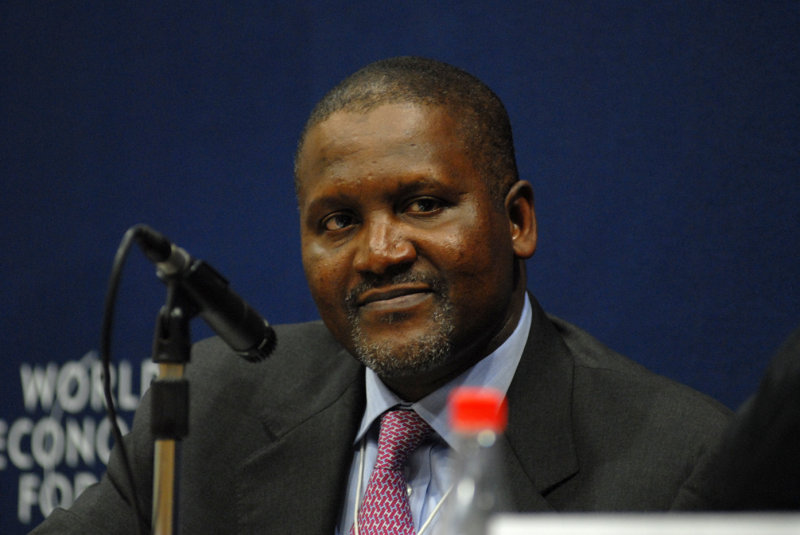Iyinoluwa Aboyeji: “Tear down this cement wall!” – Aliko Dangote and Nigeria’s Accidental Billionaires (YNaija Frontpage)
“I’m like Che Guevara with bling on, I’m complex”
– Jay-Z (Public Service Announcement)
Last week, Forbes released a report that showed Aliko Dangote’s personal worth of $11.2 billion actually constitutes 2.4% of the Nigeria’s GDP at $414 billion.
Let us put these figures in some badly needed context:
John D Rockerfeller, one of America’s richest men ever, commanded a personal fortune of 1.53% of the US’ GDP at the time of his death. In fact, even today, the personal fortunes of Bill Gates and Warren Buffet, the two richest men in America, collectively fall short of 1% of the US’ GDP today.
Why am I sharing these statistics with you? Because statistics like this show the stark reality of economic inequality and opportunity in this country. Indeed, it is quickly approaching criminal proportions.
Now don’t get me wrong; Dangote might be wealthy because he is an amazing business man who works hard for his money and deserves it. After all, given our political climate doing any kind of business in Nigeria is not for the faint-hearted. However, I contend that in Nigeria, it is the government’s economic policies as opposed to the sheer ingenuity or talent of Nigeria’s richest persons, that has resulted in this unusual concentration of the country’s wealth.
As all should know, Dangote is a man whose fortune he has built entirely on trade, domestic and international. In many ways, Dangote and his conglomerate are the nation’s store keepers, importing and selling to us panaceas for our most basic needs; food clothing and shelter. However, what is particularly interesting about Dangote’s businesses are that they are, almost without exception, successful by virtue of incredulous monopolies granted to him by government issued import licenses in industries well-guarded by an arsenal of import bans and unconscionable tarrifs. What is particularly shocking about this arrangement is that it almost always means the impoverished Nigerian consumer is paying far more than world prices for his most basic needs.
One rather ironic example of the impact Dangote’s monopolies have had on our development is in the area of infrastructure, where government has identified a deficit of $200 billion. Clearly, this far exceeds what the government can afford. Yet, cement, an integral ingredient for developing most kinds of infrastructure carries a 35% duty tax and costs $260 per metric tonne in Nigeria as opposed to Hongkong, another infrastructure needy country where cement costs $52 per metric tonne. As a result of our short sighted protectionism, Dangote’s cement empire stretches across West Africa and our treasury is worse off for it. You are forgiven for thinking the first thing a government that is serious about infrastructure will do is open up the cement market by totally deregulating it. Begging Dangote to crash prices on National Television is apparently easier.
And you know what? The tragedy of these policies is that the government and its private sector agents are quick to market this economic terrorism as pro-poor and pro-development. Unfortunately, several years of bad economics education in our country has allowed these social propagandists armed with government megaphones, non-existent job promises and aimless philanthropy to successful brainwash the average Nigerian into believing that the only way Nigerian businesses can survive is if they are insulated from the realities of an increasingly global market place through protectionist trade policies designed keep prices high and people poor. In the end, the majority who are harmed by protectionist trade policies must toil extra for a government appointed capitalist just to make ends meet.
Nigeria does not need accidental billionaires made by government fiat on the backs of the bottom billion. It needs conscientious social entrepreneurs who are not afraid to face the world.
Finally, President Goodluck, erase those import licenses and tear down this cement wall.
Iyinoluwa Aboyeji | On Leaders and Company
Aboyeji is CEO of Bookneto, a student focused education technology company based in Canada. In 2008, he worked as an intern at the Settlement and Integration Services Organization in Hamilton and then went on to work with the World Youth Alliance at the UN Headquarters in New York as an intern. Shortly before founding Bookneto, he served as the President of one of Canada’s largest student publishing companies, Imprint Publications.
Via http://ynaija.com/iyinoluwa-aboyeji-tear-down-this-cement-wall-aliko-dangote-and-nigerias-accidental-billionaires-ynaija-frontpage/


